How to uninstall InitiatorRecord from affected computers)
Mac VirusAlso Known As: Ads by InitiatorRecord
Get free scan and check if your device is infected.
Remove it nowTo use full-featured product, you have to purchase a license for Combo Cleaner. Seven days free trial available. Combo Cleaner is owned and operated by RCS LT, the parent company of PCRisk.com.
What kind of application is InitiatorRecord?
Following a thorough examination, we have discovered that InitiatorRecord delivers intrusive advertisements. As a result, InitiatorRecord has been categorized as adware. It is crucial to note that applications of this nature may be crafted to collect diverse information and are often disseminated through deceptive means.
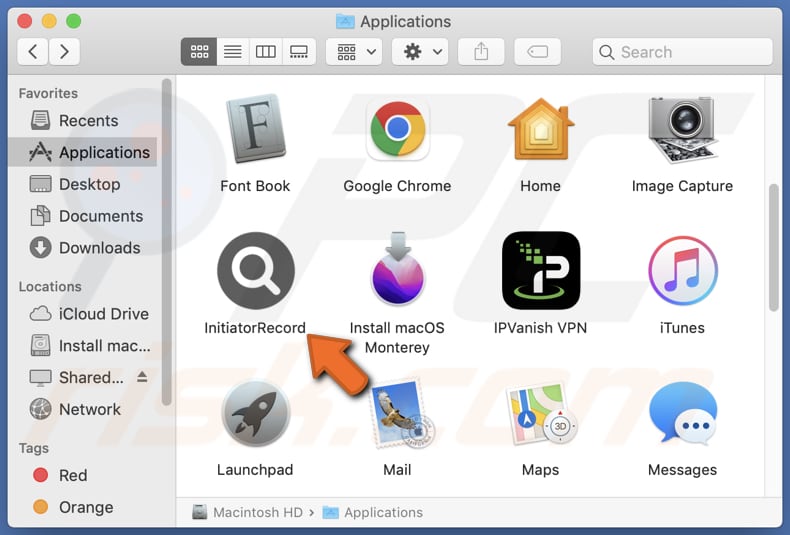
InitiatorRecord adware in detail
Apps like InitiatorRecord often bombard users with unwanted pop-ups, banners, coupons, and other advertisements, creating a disruptive and frustrating online experience. Such intrusive ads can not only hinder productivity but also expose users to potential security threats. Also, these ads can open shady pages.
Interacting with those ads may lead users to fraudulent or phishing websites designed to trick them into revealing sensitive information, such as login credentials (e.g., usernames and passwords) or financial details. InitiatorRecord's ads might also point to pages hosting malicious content, including malware or unwanted software installations.
Given these risks, users are strongly advised to avoid interacting with ads from InitiatorRecord and to take prompt action to remove the adware from their devices to safeguard their online security and privacy. An additional reason to remove InitiatorRecord is the possible data harvesting.
Adware is notorious for collecting personal information, browsing habits, and other sensitive data without user consent. This breach of privacy can lead to the unauthorized use of personal information, potentially resulting in identity theft or other malicious activities.
Moreover, adware like InitiatorRecord can significantly impact device performance. The constant generation of ads consumes system resources, leading to slower response times, increased load times for applications, and overall diminished performance.
| Name | Ads by InitiatorRecord |
| Threat Type | Adware, Mac malware, Mac virus |
| Detection Names | Avast (MacOS:AdAgent-L [Adw]), Combo Cleaner (Gen:Variant.Adware.MAC.Adload.29), ESET-NOD32 (A Variant Of OSX/Adware.Synataeb.C), Kaspersky (Not-a-virus:HEUR:AdWare.OSX.Adload.h), Full List (VirusTotal) |
| Additional Information | This application belongs to Adload malware family. |
| Symptoms | Your Mac becomes slower than normal, you see unwanted pop-up ads, you are redirected to dubious websites. |
| Distribution methods | Deceptive pop-up ads, free software installers (bundling), torrent file downloads. |
| Damage | Internet browser tracking (potential privacy issues), display of unwanted ads, redirects to dubious websites, loss of private information. |
| Malware Removal (Windows) |
To eliminate possible malware infections, scan your computer with legitimate antivirus software. Our security researchers recommend using Combo Cleaner. Download Combo CleanerTo use full-featured product, you have to purchase a license for Combo Cleaner. 7 days free trial available. Combo Cleaner is owned and operated by RCS LT, the parent company of PCRisk.com. |
Conclusion
In conclusion, InitiatorRecord poses a threat to user privacy and computer performance. It displays intrusive ads, may collect user data, and lead to potentially unsafe websites. Removing InitiatorRecord is advised to ensure the safety of personal information and enhance the overall user experience on the affected computer.
More examples of similar applications are ObjectBuffer, SmartCharacter, and OpticalSkill.
How did InitiatorRecord install on my computer?
Users often install adware and unwanted apps without realizing it, often through deceptive means. A common scenario is when adware is bundled with free software. Users may rush through the installation steps without carefully checking the available options, unintentionally allowing the adware to be installed alongside the desired program.
Also, users install adware via downloads from unreliable sources like P2P networks, third-party downloaders, unofficial app stores, shady websites, etc. Sometimes, unintentional installations are caused by clicking misleading ads and pop-ups on unreliable pages.
How to avoid installation of unwanted applications?
Obtain software exclusively from reliable sources like official websites or well-known app stores. Take the time to thoroughly review each installation prompt when installing software, ensuring a clear understanding of the components being installed. It is important to avoid hurrying through the installation process and to carefully check for checkboxes or options indicating the inclusion of extra software.
Exercise caution when interacting with advertisements or pop-ups, particularly those that promise updates or free software. Instead, rely on official channels for updates and employ trustworthy security software to scan your system for potential threats. If your computer is already infected with InitiatorRecord, we recommend running a scan with Combo Cleaner Antivirus for Windows to automatically eliminate this adware.
The message that appears after the installation of InitiatorRecord adware:
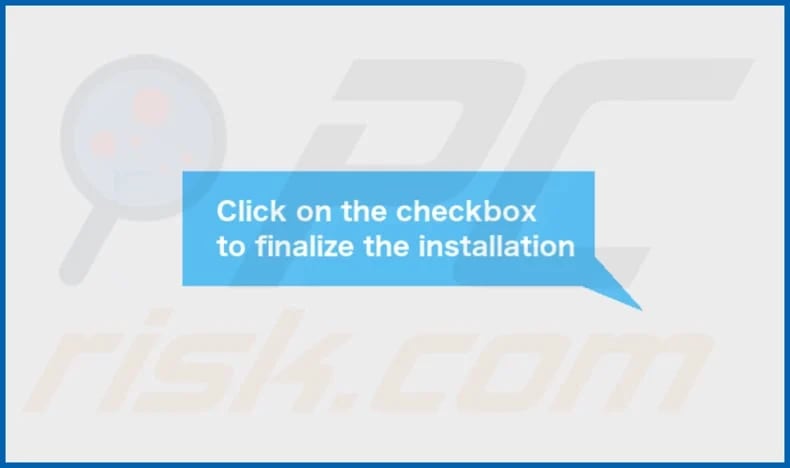
InitiatorRecord's installation folder:
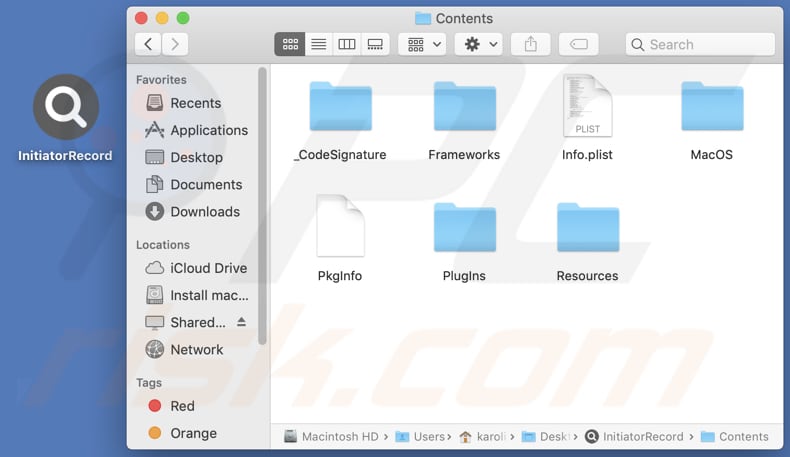
Instant automatic malware removal:
Manual threat removal might be a lengthy and complicated process that requires advanced IT skills. Combo Cleaner is a professional automatic malware removal tool that is recommended to get rid of malware. Download it by clicking the button below:
DOWNLOAD Combo CleanerBy downloading any software listed on this website you agree to our Privacy Policy and Terms of Use. To use full-featured product, you have to purchase a license for Combo Cleaner. 7 days free trial available. Combo Cleaner is owned and operated by RCS LT, the parent company of PCRisk.com.
Quick menu:
- What is InitiatorRecord?
- STEP 1. Remove InitiatorRecord related files and folders from OSX.
- STEP 2. Remove InitiatorRecord ads from Safari.
- STEP 3. Remove InitiatorRecord adware from Google Chrome.
- STEP 4. Remove InitiatorRecord ads from Mozilla Firefox.
Video showing how to remove InitiatorRecord adware using Combo Cleaner:
InitiatorRecord adware removal:
Remove InitiatorRecord-related potentially unwanted applications from your "Applications" folder:
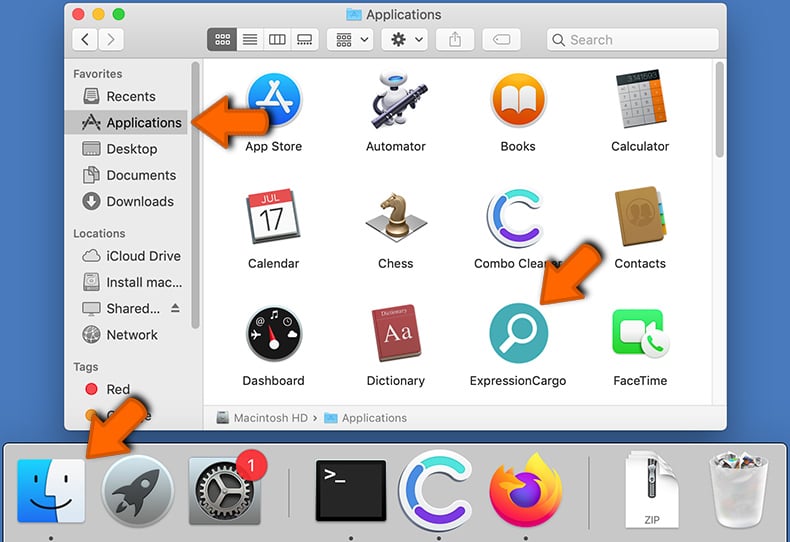
Click the Finder icon. In the Finder window, select "Applications". In the applications folder, look for "MPlayerX", "NicePlayer", or other suspicious applications and drag them to the Trash. After removing the potentially unwanted application(s) that cause online ads, scan your Mac for any remaining unwanted components.
DOWNLOAD remover for malware infections
Combo Cleaner checks if your computer is infected with malware. To use full-featured product, you have to purchase a license for Combo Cleaner. 7 days free trial available. Combo Cleaner is owned and operated by RCS LT, the parent company of PCRisk.com.
Remove adware-related files and folders
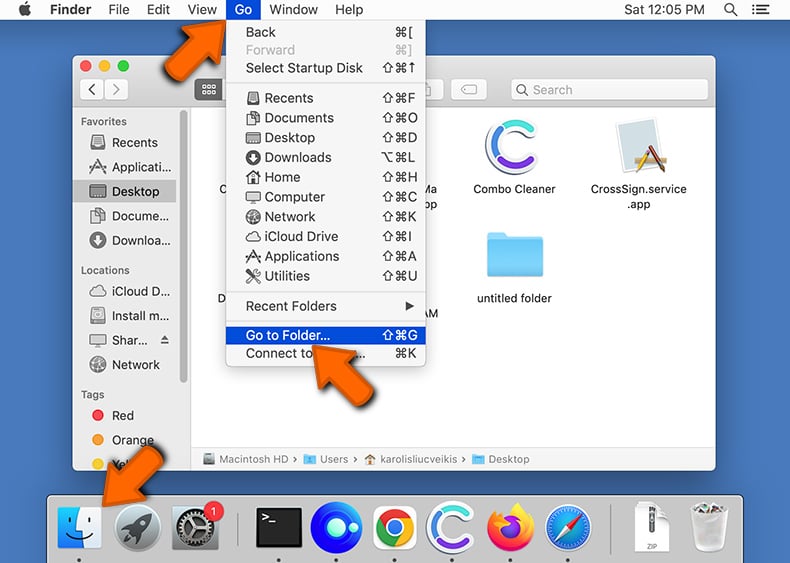
Click the Finder icon, from the menu bar. Choose Go, and click Go to Folder...
 Check for adware generated files in the /Library/LaunchAgents/ folder:
Check for adware generated files in the /Library/LaunchAgents/ folder:
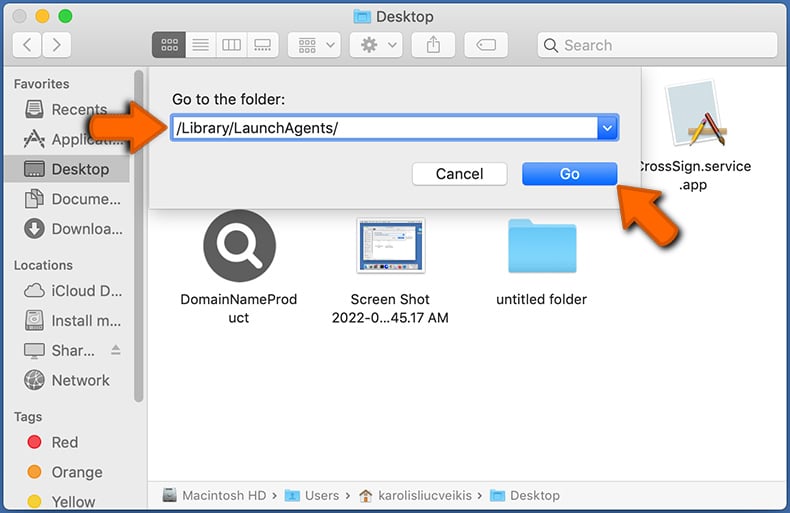
In the Go to Folder... bar, type: /Library/LaunchAgents/
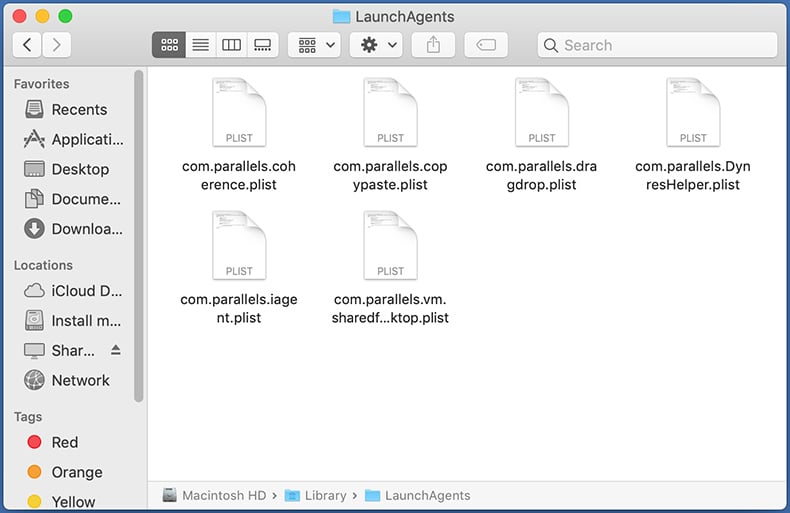
In the "LaunchAgents" folder, look for any recently-added suspicious files and move them to the Trash. Examples of files generated by adware - "installmac.AppRemoval.plist", "myppes.download.plist", "mykotlerino.ltvbit.plist", "kuklorest.update.plist", etc. Adware commonly installs several files with the exact same string.
 Check for adware generated files in the ~/Library/Application Support/ folder:
Check for adware generated files in the ~/Library/Application Support/ folder:
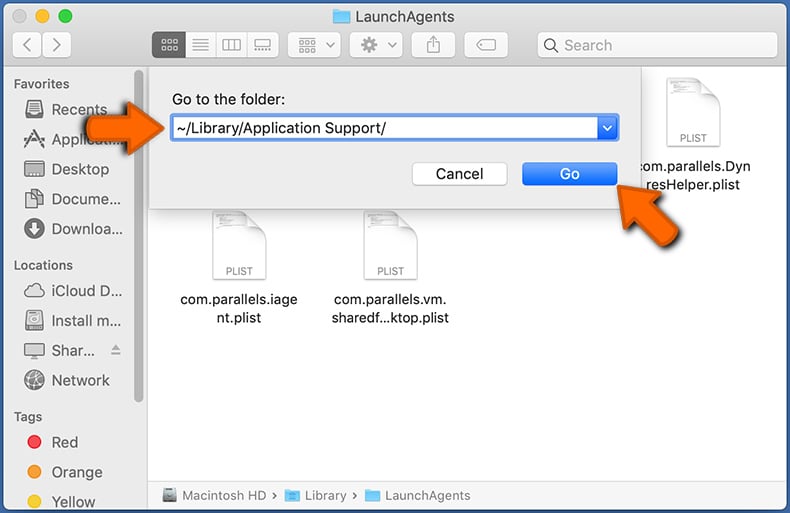
In the Go to Folder... bar, type: ~/Library/Application Support/
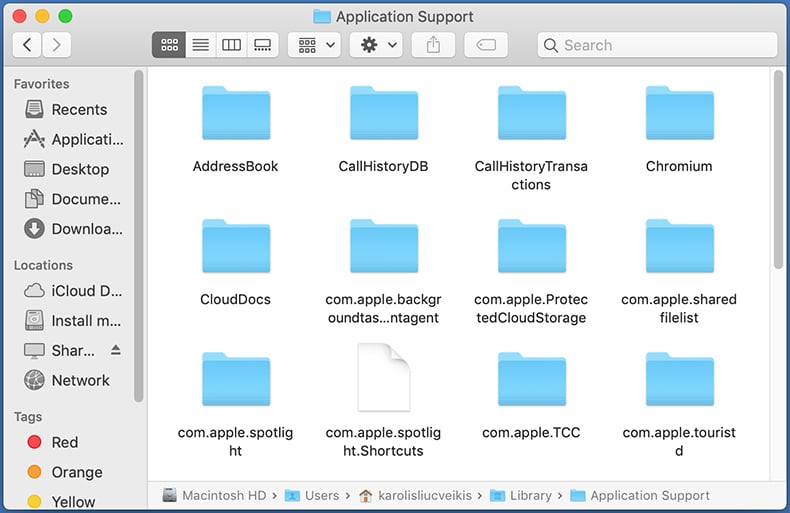
In the "Application Support" folder, look for any recently-added suspicious folders. For example, "MplayerX" or "NicePlayer", and move these folders to the Trash.
 Check for adware generated files in the ~/Library/LaunchAgents/ folder:
Check for adware generated files in the ~/Library/LaunchAgents/ folder:
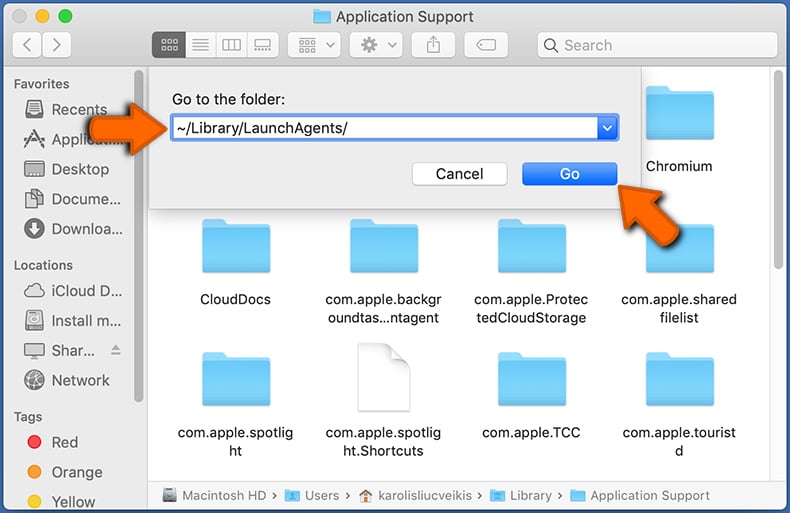
In the Go to Folder... bar, type: ~/Library/LaunchAgents/
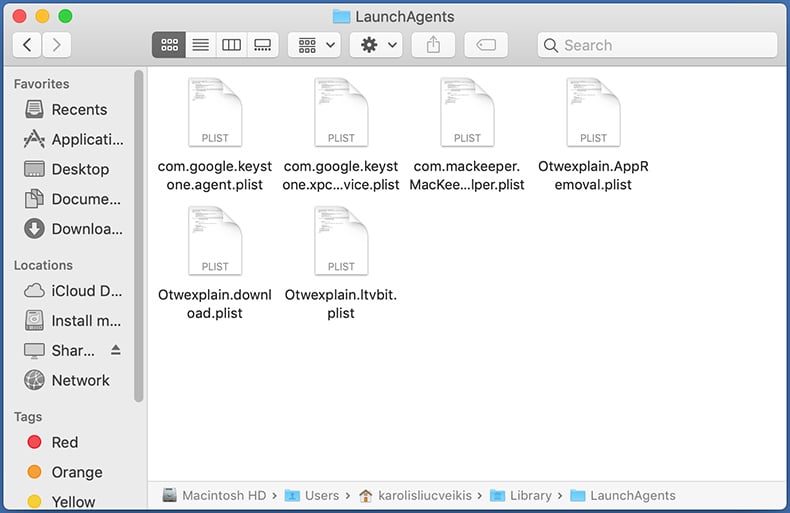
In the "LaunchAgents" folder, look for any recently-added suspicious files and move them to the Trash. Examples of files generated by adware - "installmac.AppRemoval.plist", "myppes.download.plist", "mykotlerino.ltvbit.plist", "kuklorest.update.plist", etc. Adware commonly installs several files with the exact same string.
 Check for adware generated files in the /Library/LaunchDaemons/ folder:
Check for adware generated files in the /Library/LaunchDaemons/ folder:
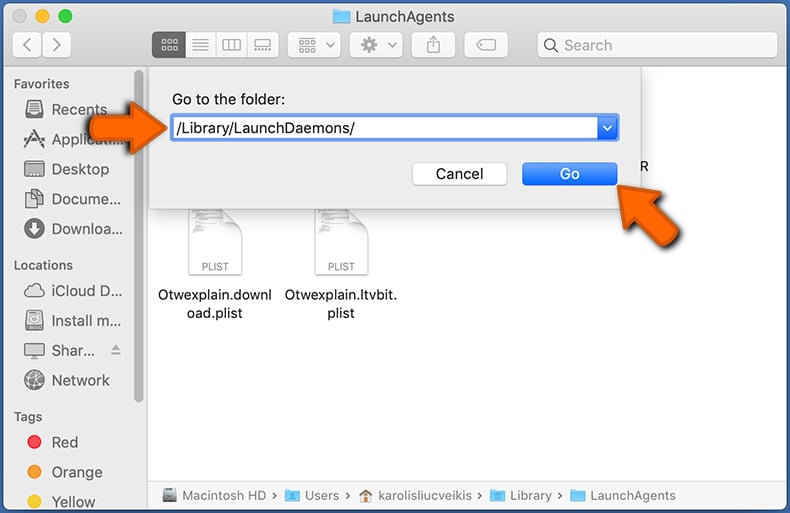
In the "Go to Folder..." bar, type: /Library/LaunchDaemons/
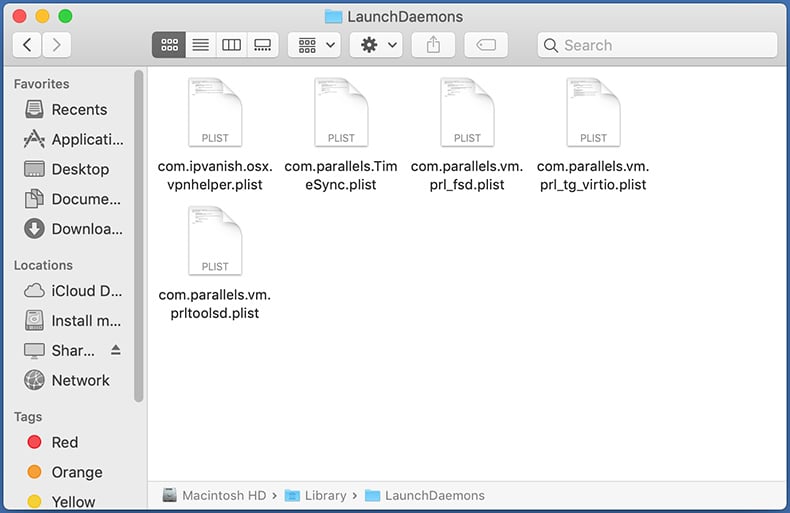
In the "LaunchDaemons" folder, look for recently-added suspicious files. For example "com.aoudad.net-preferences.plist", "com.myppes.net-preferences.plist", "com.kuklorest.net-preferences.plist", "com.avickUpd.plist", etc., and move them to the Trash.
 Scan your Mac with Combo Cleaner:
Scan your Mac with Combo Cleaner:
If you have followed all the steps correctly, your Mac should be clean of infections. To ensure your system is not infected, run a scan with Combo Cleaner Antivirus. Download it HERE. After downloading the file, double click combocleaner.dmg installer. In the opened window, drag and drop the Combo Cleaner icon on top of the Applications icon. Now open your launchpad and click on the Combo Cleaner icon. Wait until Combo Cleaner updates its virus definition database and click the "Start Combo Scan" button.
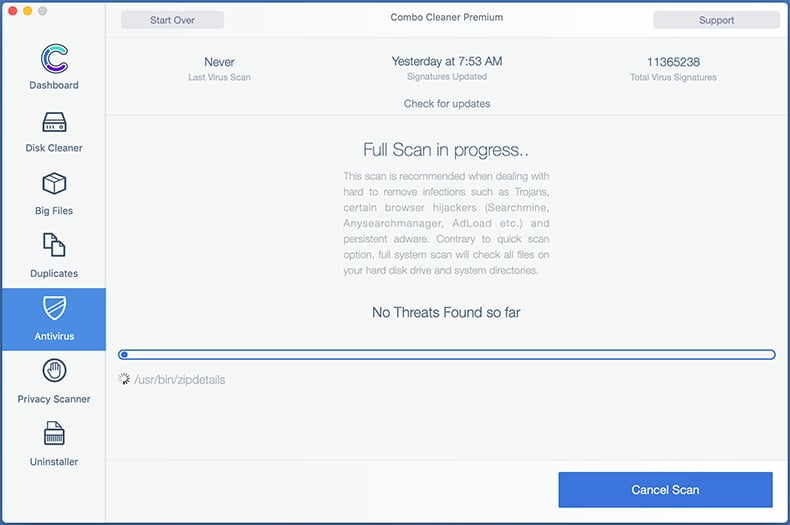
Combo Cleaner will scan your Mac for malware infections. If the antivirus scan displays "no threats found" - this means that you can continue with the removal guide; otherwise, it's recommended to remove any found infections before continuing.
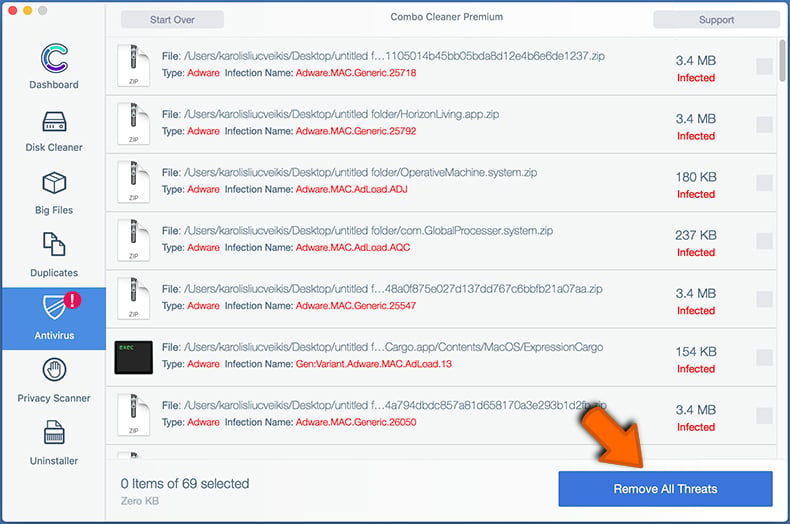
After removing files and folders generated by the adware, continue to remove rogue extensions from your Internet browsers.
Remove malicious extensions from Internet browsers
 Remove malicious Safari extensions:
Remove malicious Safari extensions:
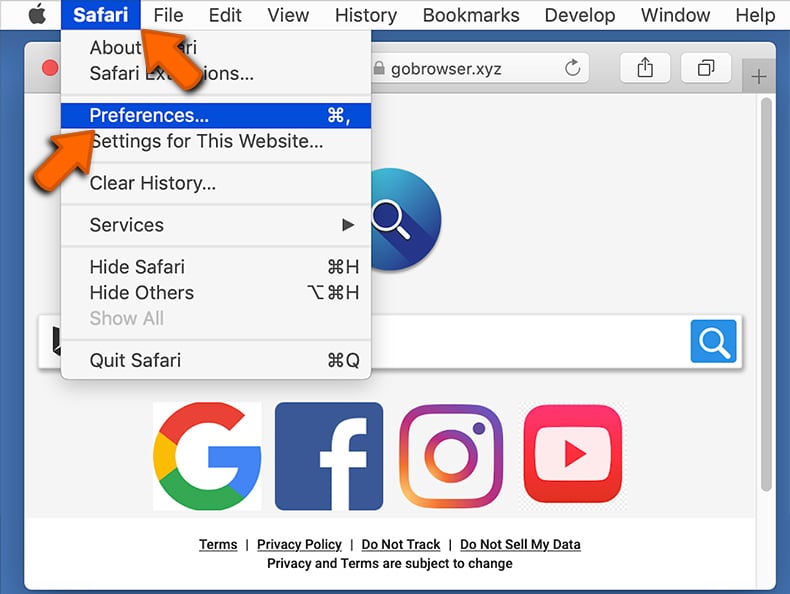
Open the Safari browser, from the menu bar, select "Safari" and click "Preferences...".
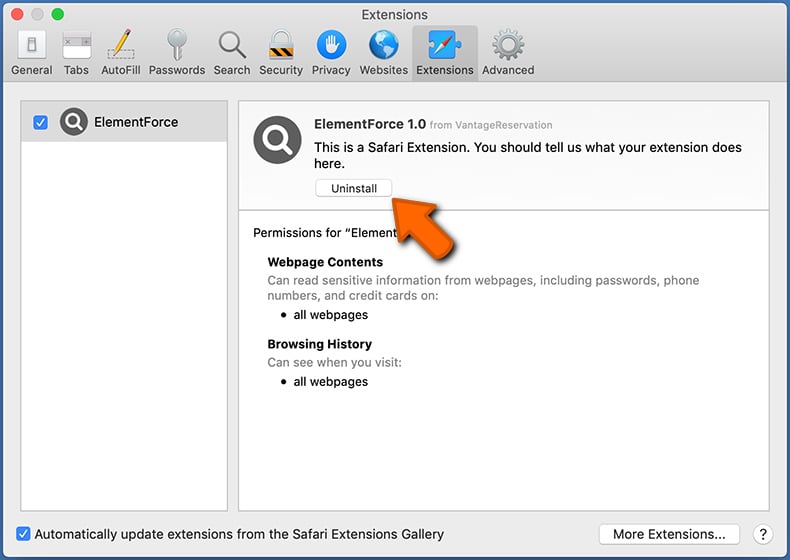
In the preferences window, select "Extensions" and look for any recently-installed suspicious extensions. When located, click the "Uninstall" button next to it/them. Note that you can safely uninstall all extensions from your Safari browser - none are crucial for regular browser operation.
- If you continue to have problems with browser redirects and unwanted advertisements - Reset Safari.
 Remove malicious extensions from Google Chrome:
Remove malicious extensions from Google Chrome:
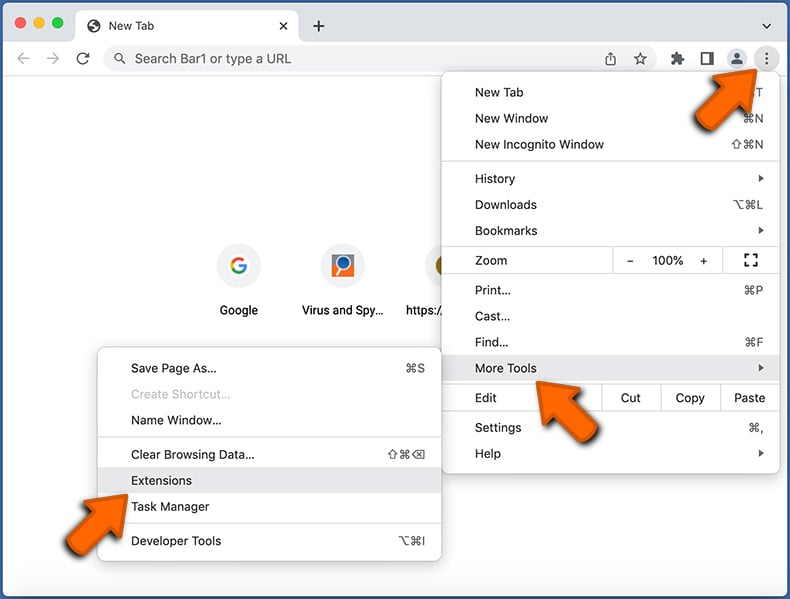
Click the Chrome menu icon ![]() (at the top right corner of Google Chrome), select "More Tools" and click "Extensions". Locate all recently-installed suspicious extensions, select these entries and click "Remove".
(at the top right corner of Google Chrome), select "More Tools" and click "Extensions". Locate all recently-installed suspicious extensions, select these entries and click "Remove".
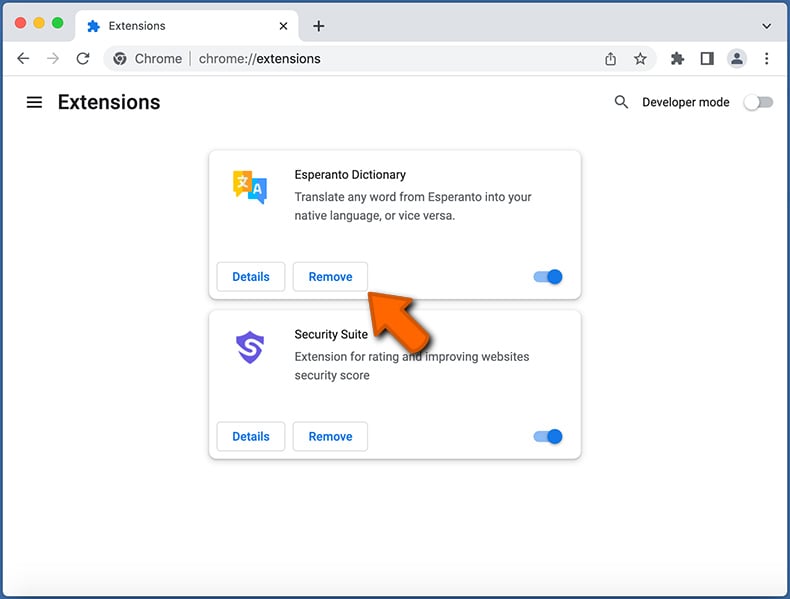
- If you continue to have problems with browser redirects and unwanted advertisements - Reset Google Chrome.
 Remove malicious extensions from Mozilla Firefox:
Remove malicious extensions from Mozilla Firefox:
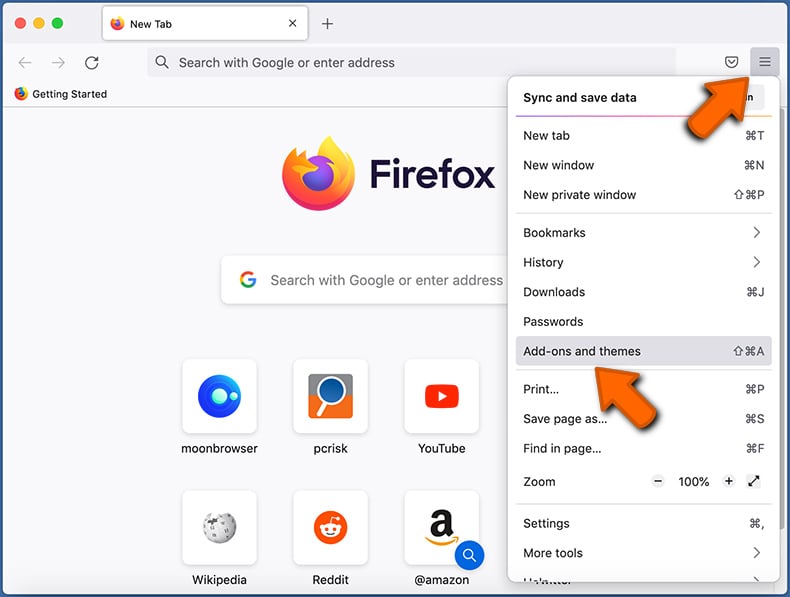
Click the Firefox menu ![]() (at the top right corner of the main window) and select "Add-ons and themes". Click "Extensions", in the opened window locate all recently-installed suspicious extensions, click on the three dots and then click "Remove".
(at the top right corner of the main window) and select "Add-ons and themes". Click "Extensions", in the opened window locate all recently-installed suspicious extensions, click on the three dots and then click "Remove".
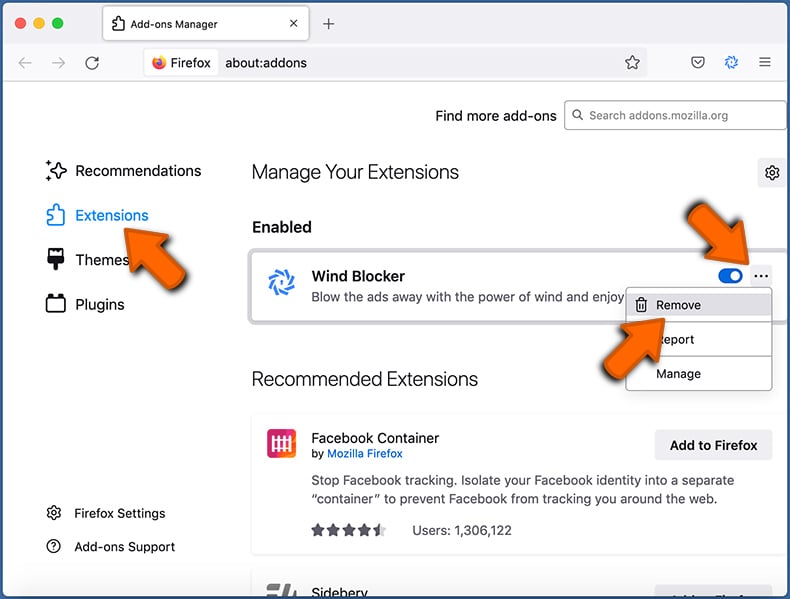
- If you continue to have problems with browser redirects and unwanted advertisements - Reset Mozilla Firefox.
Frequently Asked Questions (FAQ)
What harm can adware cause?
Adware can give rise to different problems, such as presenting intrusive ads and potential privacy concerns through the monitoring of user activities. Moreover, adware can have a notable effect on computer performance, causing slowdowns and resource consumption.
What does adware do?
Adware is a type of software designed to show advertisements to users. In addition to presenting intrusive ads, certain adware programs may gather information and take control of web browsers.
How do adware developers generate revenue?
Developers of adware generate income through various methods, with one prevalent approach being involvement in affiliate programs. In affiliate marketing, developers receive compensation for directing traffic to or facilitating actions (such as clicks or installations) for third-party products or services.
Will Combo Cleaner remove InitiatorRecord adware?
Combo Cleaner will scan your computer thoroughly and remove all adware applications. It is crucial to note that manual removal may not be sufficient, as some files may persist even after uninstalling the software.
Share:

Tomas Meskauskas
Expert security researcher, professional malware analyst
I am passionate about computer security and technology. I have an experience of over 10 years working in various companies related to computer technical issue solving and Internet security. I have been working as an author and editor for pcrisk.com since 2010. Follow me on Twitter and LinkedIn to stay informed about the latest online security threats.
PCrisk security portal is brought by a company RCS LT.
Joined forces of security researchers help educate computer users about the latest online security threats. More information about the company RCS LT.
Our malware removal guides are free. However, if you want to support us you can send us a donation.
DonatePCrisk security portal is brought by a company RCS LT.
Joined forces of security researchers help educate computer users about the latest online security threats. More information about the company RCS LT.
Our malware removal guides are free. However, if you want to support us you can send us a donation.
Donate
▼ Show Discussion